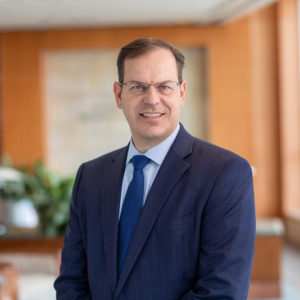Startups Get a Leg Up with Mayo Clinic Platform_Accelerate
// By Althea Fung //
 Health tech is booming. With digital technology, healthcare providers can offer patients effective interventions, in-person and remotely. This has become increasingly important throughout the COVID-19 global pandemic, as the use of telehealth and remote monitoring has accelerated. According to the latest Healthcare Investment and Exits report from the Silicon Valley Bank, investors are pouring billions into health tech companies — $15.3 billion in 2020, up from $10.6 billion in 2019.
Health tech is booming. With digital technology, healthcare providers can offer patients effective interventions, in-person and remotely. This has become increasingly important throughout the COVID-19 global pandemic, as the use of telehealth and remote monitoring has accelerated. According to the latest Healthcare Investment and Exits report from the Silicon Valley Bank, investors are pouring billions into health tech companies — $15.3 billion in 2020, up from $10.6 billion in 2019.
For health tech startups in the seed to series A — those companies with a minimum viable product (MVP) at one institution or with gaps in clinical evidence — Mayo Clinic is helping to provide model and clinical validation. In March, Mayo Clinic Platform (MCP) Accelerate program will help early-stage health tech AI (artificial intelligence) startups get market-ready with a 20-week training program.

Eric Harnisch, senior director, Advanced and Emerging Technologies, Mayo Clinic Platform
“[It is] a program designed to help early-stage companies with an innovative idea in the proof-of-concept stage focus on clinical validation and readiness,” says Eric Harnisch, senior director, Advanced and Emerging Technologies at Mayo Clinic Platform.
MCP_Accelerate is one of several initiatives in the Mayo Clinic Platform, a division established by the health system in 2019 to harness emerging technologies to provide the best possible care to everyone, everywhere.
“Organizations have been collaborating with each other for a long time. What we wanted to do with the Platform was build an ecosystem of trusted partners to enable new knowledge, new solutions, and new technologies,” Harnisch says.
“Mayo Clinic is partnering with providers, pharmaceutical companies, medical device companies, health tech startups, and payers to drive innovation around diagnosis, treatment, and operational improvement. These institutions aren’t going to transform healthcare by themselves, and Mayo Clinic is uniquely positioned to make these collaborations possible.”
Beyond an Incubator and Accelerator
While MCP_Accelerate might give off startup incubator vibes, Harnisch says it fills a gap between incubator, accelerators, early-stage venture capitalists, and market scale.
“We’re complementary to these startup support organizations. Some of those companies within these organizations’ portfolios are starting from the very beginning — help me assemble my team, my cofounders, help me create my business plan. They’re building up to the point where they have a prototype, but they need to see more clinical validation, more evidence. That’s where Mayo Clinic can bring in a lot of our assets to help them,” he says.
“These institutions aren’t going to transform healthcare by themselves, and Mayo Clinic is uniquely positioned to make these collaborations possible.”
Startups accepted to the program will have their plans evaluated by the Platform team and reviewed for ethical concerns and scalability during the Week 1 in-person training session. In subsequent weeks, working with assigned mentors, the startups will get guidance on relevant topics, including technology, business, clinical, and regulatory affairs. Additionally, startups have the opportunity to learn about workflow integration and clinical collaboration for research trials.
Harnisch says by Week 20 (graduation), the startups will share their progress with mentors and other cohorts. The companies also will have the opportunity to continue working with Mayo Clinic at the end of the program.
Finding the First Cohort Group
According to Venture Scanner, with so many health tech startups — an estimated 3,643 — selecting just a handful of promising startups can be a challenge. So, to help ease the process, Harnisch’s team reached out to organizations like Y Combinator, Flare Capital Partners, and other venture capital firms to recruit from their previous graduates.
In this video clip, Harnisch explains the criteria for choosing the startup companies.
“We said to them, ‘Let’s look at your portfolio of companies because you’ve done a lot of due diligence and analysis. Which ones do you feel have the potential to transform health care?’” Harnisch says. Mayo Clinic Platform also opened the application process on its website.
“We’re not trying to limit it to just companies that would benefit the Mayo Clinic.”
Additionally, Harnisch’s team focused on companies that could significantly impact healthcare globally and also considered priorities of the Mayo Clinic.
“Our market areas of interest are early cancer detection, hospital-at-home capabilities, optimizing clinical trials, and many more. We are looking broadly at saying, ‘Is this going to transform healthcare?’ If someone says, ‘Well, Mayo doesn’t see a lot of those patients, but this is a global issue,’ they still would be a top finalist. We’re not trying to limit it to just companies that would benefit the Mayo Clinic.”
Creating a New Standard
With MCP_Accelerate, Harnisch doesn’t just hope to help his cohort of startups succeed in the health tech industry; he hopes to create a standardized curriculum that scales to hundreds of startups annually working collaboratively with the Mayo Clinic Platform ecosystem.
“When these companies have gone through this program, they’re going to be more educated about how to work with other large health systems, from simple things like contracting to workflow integrations. How can they start to navigate other health systems?” he says. “When they get in front of another health system and the health system says, ‘Tell me about your privacy and security policies,’ they can say, ‘Here’s our certifications.’ They’ll be recognized as things the other health systems are looking for.”
“When these companies have gone through this program, they’re going to be more educated about how to work with other large health systems.”
The first class of cohorts were notified in January 2022. Recruitment for the second class, scheduled for the summer of 2022, will begin in the spring. Harnisch hopes in the future that cohort classes will be able to include international companies, but the first class will include only companies based in the U.S.
Applications for the inaugural cohort are now closed. Visit Mayo Clinic Platform_Accelerate for information about the next session, planned for summer 2022.
Althea A. Fung is a digital content strategist and healthcare journalist. Email her at fungus@altheafung.com.

